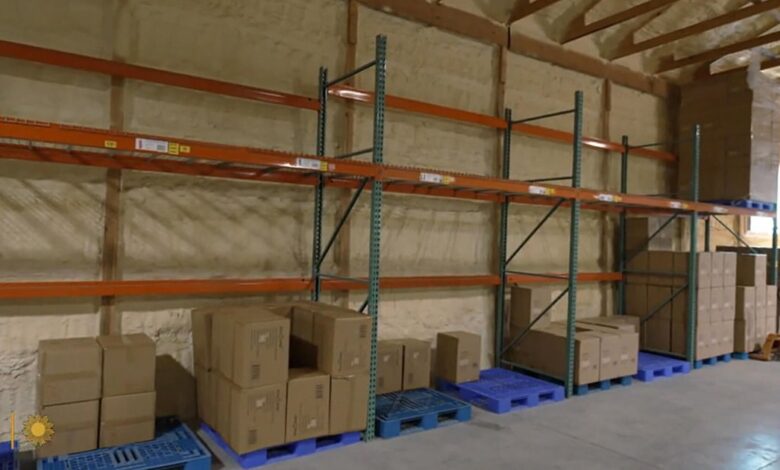How Trump’s tariffs jeopardize small businesses

President Trump’s tariffs have sent shockwaves through the small business community, putting the livelihoods of many entrepreneurs at risk. The sudden and unpredictable nature of these tariffs has left small business owners scrambling to adapt to the new economic landscape. Correspondent Jo Ling Kent recently sat down with two small business owners in Minnesota to discuss the impact of these tariffs on their operations.
Marissa Held-Nordling, owner of a children’s boutique in Minnesota, expressed deep concerns about her ability to stock her store in the face of escalating tariffs. With the cost of imported goods on the rise, she fears that she may soon be unable to offer a diverse range of products to her customers. The uncertainty surrounding future tariffs has left her in a state of constant worry, unsure of how she will be able to sustain her business in the long run.
Another Minnesota small business owner, Beth Benike, who was named “Small Businessperson of the Year,” shared her own struggles with the tariffs. Benike revealed that the increased costs imposed by the tariffs may force her to make difficult decisions, such as potentially losing her house. The financial strain caused by the tariffs has put her in a precarious position, threatening the very existence of her business.
Economic analyst Kyla Scanlon weighed in on the situation, labeling the tariffs as an unnecessary burden on small businesses. Scanlon pointed out that the unpredictability of the tariffs has created a sense of instability in the small business community, making it difficult for entrepreneurs to plan for the future. The ripple effects of these tariffs are far-reaching, with small businesses facing the brunt of the economic impact.
As small businesses continue to navigate the challenges posed by President Trump’s tariffs, it is clear that urgent action is needed to support these entrepreneurs. With their livelihoods at stake, small business owners are calling for a more predictable and sustainable trade policy that will allow them to thrive in an increasingly competitive market. Only time will tell how these tariffs will ultimately shape the future of small businesses across the country. Kent also talks with economic analyst Kyla Scanlon, who says the tariffs are an unnecessary burden. Scanlon explains that the tariffs are causing small businesses to struggle with rising costs, making it difficult for them to compete with larger corporations. She emphasizes that the tariffs are hurting the American economy as a whole, as small businesses are the backbone of the country’s economic growth.
Scanlon points out that the tariffs are not only affecting small businesses, but also consumers who are facing higher prices on everyday goods. She warns that if the tariffs continue, it could lead to job losses and a slowdown in economic growth.
Kent also speaks with Senator John Johnson, who defends the tariffs as necessary to protect American jobs. Johnson argues that the tariffs are part of a larger strategy to level the playing field with other countries and to ensure fair trade practices. He believes that the short-term pain caused by the tariffs will lead to long-term benefits for the American economy.
Overall, the interviews with small business owners, economic analysts, and policymakers highlight the complex impact of President Trump’s tariffs on small businesses. While some see the tariffs as a necessary step to protect American jobs, others argue that they are causing unnecessary harm to small businesses and consumers. The debate over tariffs continues to be a contentious issue in the ongoing discussion about trade policy and economic growth. It has been a common belief that success is achieved through hard work, determination, and perseverance. While these qualities are undoubtedly important in achieving one’s goals, recent studies have shown that luck may also play a significant role in success.
According to a study conducted by the University of Catania in Italy, luck can have a profound impact on an individual’s success. The study found that luck is not just a matter of chance, but rather a combination of factors that can influence the outcome of a person’s efforts.
One of the key factors that determine luck is timing. Being in the right place at the right time can greatly increase the likelihood of success. For example, a person who launches a new product during a period of high demand is more likely to succeed than someone who launches the same product during a recession.
Another factor that contributes to luck is social connections. Networking and building relationships with influential people can open doors to new opportunities and increase the chances of success. In fact, studies have shown that people who have a strong social network are more likely to achieve their goals than those who do not.
Additionally, mindset plays a crucial role in attracting luck. People who have a positive attitude and believe in their ability to succeed are more likely to take risks and seize opportunities when they arise. This optimism can create a self-fulfilling prophecy, leading to greater success in the long run.
While luck may play a role in success, it is important to note that it is not the sole determining factor. Hard work, determination, and skill are still essential components of achieving one’s goals. However, acknowledging the role of luck can help individuals recognize and capitalize on opportunities that come their way.
In conclusion, luck does play a significant role in success. By understanding the factors that contribute to luck, individuals can increase their chances of achieving their goals. By combining hard work, determination, and a positive mindset with a little bit of luck, anyone can increase their chances of success in any endeavor. New research has revealed that there may be a link between a person’s gut health and their overall mental well-being. The study, conducted by a team of researchers at the University of California, Los Angeles, found that individuals with a diverse and healthy gut microbiome were less likely to experience symptoms of depression and anxiety.
The gut microbiome is a complex community of bacteria, fungi, and other microorganisms that live in the digestive tract. These microorganisms play a crucial role in maintaining gut health and supporting digestion, but recent studies have suggested that they may also have a significant impact on mental health.
In the study, researchers analyzed the gut microbiomes of over 1,000 participants and compared them to self-reported symptoms of depression and anxiety. They found that individuals with a more diverse microbiome were less likely to experience symptoms of these mental health disorders.
One possible explanation for this link is the role that the gut microbiome plays in producing neurotransmitters, the chemicals that regulate mood and emotions in the brain. For example, certain bacteria in the gut are known to produce serotonin, a neurotransmitter that is often referred to as the “feel-good” chemical. A healthy gut microbiome may therefore help to regulate levels of serotonin and other neurotransmitters, potentially reducing the risk of depression and anxiety.
The researchers also found that individuals with a more diverse gut microbiome had lower levels of inflammation in their bodies. Chronic inflammation has been linked to a range of health problems, including mental health disorders, so reducing inflammation through a healthy gut microbiome may be another way in which gut health influences mental well-being.
These findings suggest that taking care of your gut health may be an important factor in maintaining good mental health. There are several ways to support a healthy gut microbiome, including eating a diverse diet rich in fiber and fermented foods, avoiding antibiotics unless necessary, and managing stress levels.
Further research is needed to fully understand the relationship between gut health and mental well-being, but these findings highlight the importance of taking care of your gut for both your physical and mental health. By supporting a diverse and healthy gut microbiome, you may be able to reduce your risk of experiencing symptoms of depression and anxiety and improve your overall well-being. The technological advancements of the 21st century have revolutionized the way we live, work, and communicate. From the rise of social media to the advent of artificial intelligence, technology has become an integral part of our daily lives. One area that has seen significant growth and innovation in recent years is the field of virtual reality (VR).
Virtual reality technology allows users to immerse themselves in a computer-generated environment, where they can interact with objects and experience a sense of presence in a virtual world. VR headsets, such as the Oculus Rift and HTC Vive, have become increasingly popular among gamers and tech enthusiasts, but the applications of VR extend far beyond entertainment.
One of the most promising uses of VR technology is in the field of healthcare. VR has been shown to be an effective tool for treating a variety of medical conditions, including phobias, PTSD, and chronic pain. By creating immersive virtual environments, therapists can help patients confront their fears in a safe and controlled setting, leading to faster and more effective treatment outcomes.
In addition to its therapeutic applications, VR is also being used in medical training and education. Surgeons can practice complex procedures in a virtual environment, allowing them to hone their skills without putting patients at risk. Medical students can also benefit from VR simulations, which provide a realistic and interactive learning experience.
Beyond healthcare, VR is also being used in a variety of other industries. Architects and engineers can use VR technology to visualize and plan construction projects, while designers can create virtual prototypes of products before they are manufactured. Virtual reality tours are also becoming increasingly popular in the real estate industry, allowing potential buyers to explore properties from the comfort of their own homes.
As VR technology continues to evolve, the possibilities are endless. From virtual meetings and conferences to interactive storytelling and immersive art installations, VR has the potential to transform how we experience the world around us. While there are still challenges to overcome, such as the high cost of VR hardware and the potential for motion sickness, the future of virtual reality looks bright.
In conclusion, virtual reality technology has the potential to revolutionize a wide range of industries, from healthcare and education to entertainment and design. As the technology becomes more accessible and affordable, we can expect to see even more innovative applications of VR in the years to come. Whether you’re a gamer, a healthcare professional, or a designer, virtual reality is sure to have a profound impact on how we live, work, and play in the 21st century.





